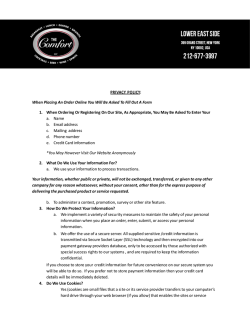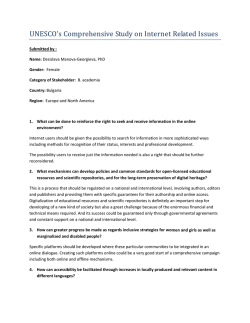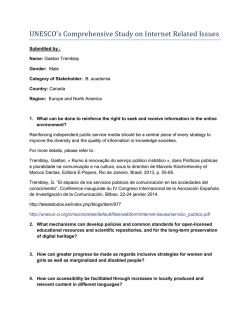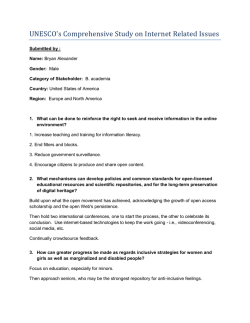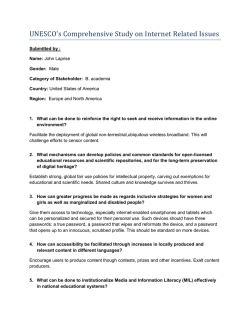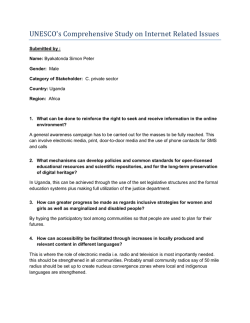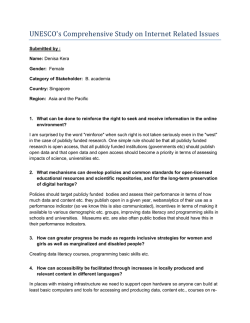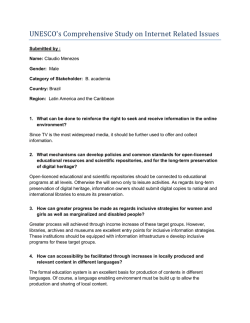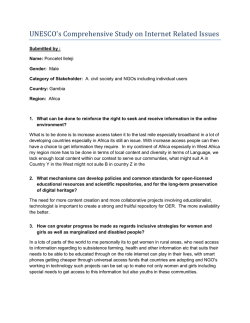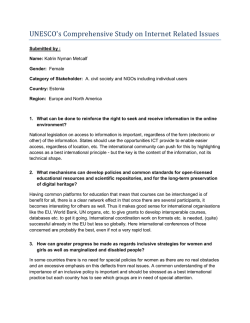
Dr. Ghanshyam Choudhary
UNESCO'sComprehensiveStudyonInternetRelatedIssues Submitted by : Name: Dr. Ghanshyam Choudhary Gender: Male Category of Stakeholder: G. individual users Country: India Region: Asia and the Pacific 1. What can be done to reinforce the right to seek and receive information in the online environment? Nothing to say 2. What mechanisms can develop policies and common standards for open‐licensed educational resources and scientific repositories, and for the long‐term preservation of digital heritage? Nothing to say 3. How can greater progress be made as regards inclusive strategies for women and girls as well as marginalized and disabled people? Nothing to say 4. How can accessibility be facilitated through increases in locally produced and relevant content in different languages? Giving language options in social sites 5. What can be done to institutionalize Media and Information Literacy (MIL) effectively in national educational systems? Nothing to say 6. What are the current and emerging challenges relevant to freedom of expression online? Some governments' attempts to reduce this freedom 7. How can legislation in a diverse range of fields which impacts on the Internet respect freedom of expression in line with international standards? All countries should be forced to follow principles ascertaining this freedom while forming legislation. 8. Is there a need for specific protections for freedom of expression for the Internet? Yes 9. To what extent do laws protect digitally interfaced journalism and journalistic sources? I think they protect adequately. 10. What are the optimum ways to deal with online hate speech? How can Media and Information Literacy empower users to understand and exercise freedom of expression on the Internet? Only children need protection. Adults can judge and decide for themselves. So there should be complete freedom. 11. What are the optimum systems for independent self‐regulation by journalistic actors and intermediaries in cyberspace? I don't know. 12. What principles should ensure respect for the right to privacy? Privacy of others should not be violated by users unless that privacy violates others' privacy, human rights etc. 13. What is the relationship between privacy, anonymity and encryption? Privacy relates to personal life, anonymity to use of net and encryption to secrecy of documents. 14. What is the importance of transparency around limitations of privacy? Transparency should be in public affairs and privacy in personal. 15. What kinds of arrangements can help to safeguard the exercise of privacy in relation to other rights? Users violating others' privacy should be revealed to legal authorities and person whose privacy is violated. 16. How can openness and transparency of data be reconciled with privacy? As I said, openness and transparency should be in public affairs and privacy in personal affairs. 17. What may be the impact of issues relating to big data on respect for privacy? Privacy in personal activities not affecting others should be always respected and issues relating to big data should not be allowed to interfere there. 18. How can security of personal data be enhanced? That can be decided by computer experts. 19. How can Media and Information Literacy be developed to assist individuals to protect their privacy? I think this is not very important. It is related to basic development, nature and education of individuals. 20. How can ethical principles based on international human rights advance accessibility, openness, and multi‐stakeholder participation on the Internet? Human rights is supreme and people in general are not very open due to insecurity feelings. I don't know how to remove this insecurity and make people more open. 21. What conceptual frameworks or processes of inquiry could serve to analyse, assess, and thereby inform the choices that confront stakeholders in the new social uses and applications of information and knowledge? Other than supremacy of human rights, I have nothing much to say. 22. How does ethical consideration relate to gender dimensions of the Internet? Only harming an innocent is unethical, nothing else is ‐ this principle should govern all issues including gender dimensions. 23. How can ethics, ‐ i.e. the simultaneous affirmation of human rights, peace, equity, and justice ‐ inform law and regulation about the Internet? I don't know. 24. What international, regional and national frameworks, normative guidelines and accountability mechanisms exist of relevance to one or more fields of the study? I do not know. 25. How do cross‐jurisdictional issues operate with regard to freedom of expression and privacy? Interfering in privacy of others is not part of freedom of expression which relates only to matters that affect others. So problems arise only when the difference between the two is not understood properly. Users should be educated about this difference. 26. What are the intersections between the fields of study: for example, between access and freedom of expression; ethics and privacy; privacy and freedom of expression; and between all four elements? As I said, when the difference between the fields are understood clearly, there will be no intersections. 27. What pertinent information materials exist that cut across or which are relevant to the four fields of the study? It is difficult for me to say. 28. What might be the options for role of UNESCO within the wider UN system in regard to the distinct issues of online Access to information and knowledge, Freedom of Expression, Privacy and Ethical dimensions of the information society? All UN bodies should play vital roles in all international issues and the details of procedures can be decided by experts in the field only. 29. What might be options for the role of UNESCO in relation to stakeholders outside the UN system? Same as mentioned in last question, remembering the basic principle that human rights of every individual is vital. 30. For each study field, what specific options might UNESCO Member States consider? It is difficult for me to say in detail.
© Copyright 2026
